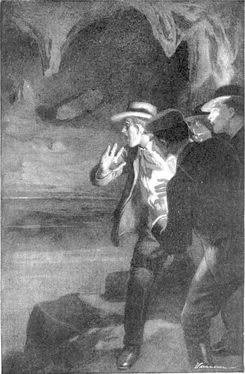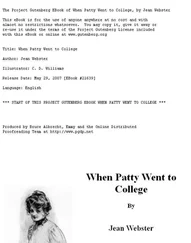Jean Webster - The Four-Pools Mystery
Здесь есть возможность читать онлайн «Jean Webster - The Four-Pools Mystery» весь текст электронной книги совершенно бесплатно (целиком полную версию без сокращений). В некоторых случаях можно слушать аудио, скачать через торрент в формате fb2 и присутствует краткое содержание. Жанр: Классический детектив, на английском языке. Описание произведения, (предисловие) а так же отзывы посетителей доступны на портале библиотеки ЛибКат.
- Название:The Four-Pools Mystery
- Автор:
- Жанр:
- Год:неизвестен
- ISBN:нет данных
- Рейтинг книги:3 / 5. Голосов: 1
-
Избранное:Добавить в избранное
- Отзывы:
-
Ваша оценка:
- 60
- 1
- 2
- 3
- 4
- 5
The Four-Pools Mystery: краткое содержание, описание и аннотация
Предлагаем к чтению аннотацию, описание, краткое содержание или предисловие (зависит от того, что написал сам автор книги «The Four-Pools Mystery»). Если вы не нашли необходимую информацию о книге — напишите в комментариях, мы постараемся отыскать её.
The Four-Pools Mystery — читать онлайн бесплатно полную книгу (весь текст) целиком
Ниже представлен текст книги, разбитый по страницам. Система сохранения места последней прочитанной страницы, позволяет с удобством читать онлайн бесплатно книгу «The Four-Pools Mystery», без необходимости каждый раз заново искать на чём Вы остановились. Поставьте закладку, и сможете в любой момент перейти на страницу, на которой закончили чтение.
Интервал:
Закладка:
"Arnold Crosby, Esq.,
"Turnips Farm, Pumpkin Corners, Va.
" Dear Sir :
"Enclosed please find clipping. Are the facts straight and have the missing bonds turned up? If not, don't you want me to run down and find them for you? Should like to meet an authenticated ghost. Wouldn't be a bad Sunday feature article. Give it my love. Is it a man or lady? Things are also moving nicely in New York—two murders and a child abducted in one week.
"How are crops?
"Yours truly,
"T. P.
"Wire me if you want me."
The clipping was headed, "Spook Cracks Safe," and was a fairly accurate account of the ha'nt and the robbery. It ended with the remark that the mystery was as yet unsolved, but that the best detective talent in the country had been engaged on the case.
I tossed the letter to Radnor with a laugh; he had already heard of Terry's connection with the Patterson-Pratt affair.
"Perhaps we couldn't do better than to get him down," I suggested; "he's most abnormally keen at ferreting out a mystery that promises any news—if any one can learn the truth about those bonds, he can."
"I don't want to know the truth," Radnor growled. "I'm sick of the very name of bonds."
And this had been his attitude from the moment the detective left. My own insistence that it was our duty to track down the thief met with nothing but a shrug. Another person might have suspected that this apathy only proved his own culpability in the theft, but such a suspicion never for a moment crossed my mind. He was, as he said, sick of the very name of bonds, and with a person of his temperament that ended the matter. Though I did not comprehend his attitude, still I took him at his word. There was something about Rad's straightforward way of looking one in the eye that impelled belief. As I had heard the Colonel boast, a Gaylord could not tell a lie.
The things a Gaylord could and could not do, were, I acknowledge, to a Northern ethical sense a trifle mystifying. A Gaylord might drink and gamble and fail to pay his debts (not his gambling debts; his tailor and his grocer); he might be the hero of many doubtful affairs with women; he might in a sudden fit of passion commit a murder—there was more than one killing in the family annals—but under no circumstances would his "honah" permit him to tell a lie. The reservation struck me somewhat humorously as an anti-climax. But nevertheless I believed it. When Rad said he knew nothing of the stolen bonds I dismissed the possibility from my mind.
Though I was relieved to feel that he was not guilty, still I was worried and nervous over the matter. I felt that it was criminal not to do something, and yet my hands were tied. I could scarcely undertake an investigation myself, for every clue led across the trail of the ha'nt, and that, Rad made it clear, was forbidden ground. The Colonel, meanwhile, was comparatively quiet, as he supposed the detective was still working on the case. I accordingly did nothing, but I kept my eyes open, hoping that something would turn up.
Rad's temper was absolutely unbearable for the first week after the detective left. The reason had nothing to do with the stolen bonds, but was concerned entirely with Polly Mathers's behavior. She barely noticed Rad's existence, so occupied was she with the ecstatic young sheriff. What the trouble was, I did not know, but I suspected that it was the whispered conjectures in regard to the ha'nt.
I remember one evening in particular that she snubbed him in the face of the entire neighborhood. We had arrived at a party a trifle late to find Polly as usual the center of a laughing group of young men, all clamoring for dances. They widened their circle to admit Rad in a way which tacitly acknowledged his prior claim. He inquired with his most deferential bow what dances she had saved for him. Polly replied in an off-hand manner that she was sorry but her card was already full. Rad shrugged nonchalantly, and sauntering toward the door, disappeared for the rest of the night. When he turned up at Four-Pools early in the morning, his horse, Uncle Jake informed me, looked as if it had been ridden by "de debbil hisself."
With Radnor in this state, and the Colonel growing daily more irritable over the continued mystery of the bonds, it is not strange that matters between them were at a high state of tension. As I saw more of the Colonel's treatment of Rad, I came to realize that there was considerable excuse for Jefferson's wildness. While he was a kind man at heart, still he had an ungovernable temper, and an absolutely tyrannical desire to rule every one about him. His was the only free will allowed on the place. He attempted to treat Rad at twenty-two much as he had done at twelve. A few months before my arrival (I heard this later) he had even struck him, whereupon Radnor had turned on his heel and walked out of the house, and had only consented to come back two weeks later when he heard that the old man was ill. If two men ever needed a woman to manage them, these were the two. I think that if my aunt had lived, most of the trouble would have been avoided.
Rad was not the only one, however, who felt the Colonel's irritation over the robbery. His treatment of the servants was harsh and even cruel. Everybody on the place went about in a half-cowed fashion. He treated Mose like a dog. Why the fellow stood it, I don't know. The Colonel seemed never to have learned that the old slave days were over and that he no longer owned the negroes body and soul. His government of the plantation was in the manner of a despot. Everybody—from his own son to the merest pickaninny—was at the mercy of his caprice. When he was in good humor, he was kindness itself to the darkies; when he was in bad humor, he vented his anger on whoever happened to be nearest.
I shall never forget the feeling of indignation with which I first saw him strike a man. A strange negro was caught one morning in the neighborhood of the chicken coop, and was brought up to the house by two of the stable-men. My uncle, who was standing on the portico steps waiting for his horse, was in a particularly savage mood, as he had just come from an altercation with Radnor. The man said that he was hungry and asked for work. But the Colonel, almost without waiting to hear him speak, fell upon him in a fit of blind rage, slashing him half a dozen times over the head and shoulders with his heavy riding crop. The negro, who was a powerfully built fellow, instead of standing up and defending himself like a man, crouched on the ground with his arms over his head.
"Please, Cunnel Gaylord," he whimpered, "le' me go! I ain't done nuffen. I ain't steal no chickens. For Gord's sake, doan whip me!"
I sprang forward with an angry exclamation and grasped my uncle's arm. The fellow was on his feet instantly and off down the lane without once glancing back. The Colonel stood a moment looking from my indignant face to the man disappearing in the distance, and burst out laughing.
"I reckon I won't be troubled with him any more," he remarked as he mounted and rode away, his good humor apparently quite restored.
I confess that it took me some time to get over that scene. But the worst of it was that he treated his own servants in the same summary fashion. The thing that puzzled me most was the way in which they received it. Mose, being always at hand, was cuffed about more than any negro on the place, but as far as I could make out, it only seemed to increase his love and veneration for the Colonel. I don't believe the situation could ever be intelligible to a Northern man.
So matters stood when I had been a month at Four-Pools. My vacation had lasted long enough, but I was supremely comfortable and very loath to go. The first few weeks of May had been, to my starved city eyes, a dazzling pageant of beauty. The landscape glowed with yellow daffodils, pink peach blossoms, and the bright green of new wheat; the fields were alive with the frisky joyousness of spring lambs and colts, turned out to pasture. It was with a keen feeling of reluctance that I faced the prospect of New York's brick and stone and asphalt. My work was calling, but I lazily postponed my departure from day to day.
Читать дальшеИнтервал:
Закладка:
Похожие книги на «The Four-Pools Mystery»
Представляем Вашему вниманию похожие книги на «The Four-Pools Mystery» списком для выбора. Мы отобрали схожую по названию и смыслу литературу в надежде предоставить читателям больше вариантов отыскать новые, интересные, ещё непрочитанные произведения.
Обсуждение, отзывы о книге «The Four-Pools Mystery» и просто собственные мнения читателей. Оставьте ваши комментарии, напишите, что Вы думаете о произведении, его смысле или главных героях. Укажите что конкретно понравилось, а что нет, и почему Вы так считаете.












